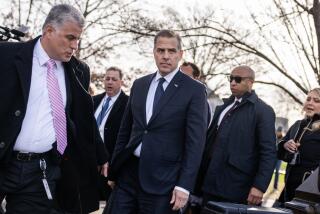Two Fathers Take Causes to Ballot Box
Behind two of the highest-profile measures on Tuesday’s ballot stands one of the oldest of human motivations: fathers seeking to help their sons.
They are not ordinary fathers. Bob Klein, the man behind Proposition 71, the stem cell ballot initiative, and Jerry Keenan, who brought to a vote Proposition 66, the three-strikes amendment, together have spent more than $5.6 million of their personal fortunes pursuing their chosen causes.
Klein’s 14-year-old son, Jordan, suffers from juvenile diabetes -- a disease that Klein and others believe could eventually be cured using therapies derived from embryonic stem cells. Keenan’s only child, Richard, is serving an eight-year sentence in prison for a car accident that left two of his passengers dead and one hurt. Should Proposition 66 pass, his time behind bars might be shortened.
The ballot measures have drawn both men into the public eye.
Klein has campaigned statewide for Proposition 71. If it passes, he would be in position to become head of the California Institute for Regenerative Medicine, which the measure would create. The post would give him influence over the $3 billion the measure would distribute during the next 10 years to researchers across the state. Opponents of the measure say the institute would distribute taxpayer money with virtually no government oversight.
Keenan’s motivations have been persistently attacked by Gov. Arnold Schwarzenegger and other Proposition 66 opponents, who accuse him of trying to buy his son’s way out of prison.
Deeply personal causes are not unusual in the initiative process -- crimes against children drove the three-strikes law to passage a decade ago. What is new is for a ballot measure to draw so directly on both the emotional capital and financial resources of parents whose children could directly benefit.
“I think it’s fascinating. Now it is a parent as opposed to people who just felt strongly about an issue,” said Robert Stern, president of the nonprofit Center for Government Studies in Los Angeles. “The question is: Is it better or worse than the special interest and labor unions pushing their agendas? I think it’s about the same. Wealthy interests are able to buy their way onto the ballot.”
When President Bush announced in August 2001 that he had decided to strictly limit how federal funds could be used for stem cell research, Bob Klein watched on television.
“At the time, I’m not sure I understood what it meant,” he said in a recent interview.
A year later, when his son was diagnosed with insulin-dependent diabetes, which can shorten a life span by decades, Klein took on the pursuit of a cure.
His search, he said, led him to the field of embryonic stem cells.
The field is controversial because embryos must be destroyed in order to obtain embryonic stem cells, which have the potential to become any type of cell in the body. Because of that potential, many scientists believe embryonic stem cells hold great promise in the treatment and understanding of diseases such as Alzheimer’s, Parkinson’s and diabetes.
What separated Klein from other parents desperate to cure a child’s debilitating illness was an idea, combined with the means and connections to put it into action. With a background in the financing of affordable housing, Klein believed that California could replace the federal government as the source of funds for research and create what he envisioned as a “substitute national program.”
The idea quickly took shape as a $3-billion bond initiative, the amount Klein determined would be needed to provide research grants as well as facilities to insulate the research from political interference.
In the mid-1970s, not long after graduating from Stanford University, Klein helped create the California Housing Finance Agency. Since 1975, the state agency, which supports itself through revenue bonds, has lent more than $12 billion to first-time homeowners. Klein used that agency as a template to guide his vision for financing research.
Klein spent the better part of a year selling his idea -- first to scientists, then to major donors, who chipped in more than $20 million, and now to voters. In doing so, he has sparingly sprinkled in his personal experience. He always mentions that his son has juvenile diabetes and his mother suffers from Alzheimer’s.
Asked about the criticism that wealthy people have an unfair advantage getting their issues on the ballot, he said he sees not an advantage but a duty.
“I think people who earn the most money in this society have an obligation to give back to society,” he said.
Klein said he crafted his measure -- and took it directly to voters -- to protect the research from political interference or financial raids by state legislators.
Opponents of the measure, however, say Klein’s initiative insulates a vast sum from any meaningful scrutiny.
“The oversight committee is anything but independent,” said Francine Coeytaux, who served on the California Advisory Committee on Human Cloning. “It’s made up of academics and scientists whose careers depend on the research and biotech people and disease advocates -- the conflict of interest is inherent in the structure of the committee. It reveals an extraordinary hubris on the part of the backers.”
Opponents of the measure suggest that Klein is positioning himself to run the institute -- a suggestion that he does not deny, saying only that he could not afford to take the position for very long.
Unlike Klein, Jerry Keenan has sought invisibility even as he spent millions in his efforts to pass Proposition 66. The ballot measure would greatly limit which defendants can be sentenced under the three-strikes law -- no longer permitting lesser felonies to trigger long sentences.
But far from remaining anonymous, Keenan has been thrust to the center of the debate as Schwarzenegger and many prosecutors have cited him as a symbol of selfishness and a threat to public safety.
“They don’t upset me,” said Keenan in a recent phone interview. “There’s one thing that I realize. They are saying it for a reason, and it’s strictly because they want to scare people.”
He has also braced himself against attacks from the mothers of the two young men who died in his son’s car. The women have appeared throughout the state opposing Proposition 66.
“I’m sure those mothers wish that Richard could have the death penalty,” Keenan said. “I can’t change their mind.”
Keenan, 54, is a lifelong Republican and Sacramento insurance brokerage owner who voted for the three-strikes law in 1994.
“My wife and I were very concerned about the murder of Polly Klaas -- certainly that crime brought the dangers to light for us,” he said, referring to the killing of a 12-year-old from Petaluma by a man with a long criminal record. “We voted for three strikes thinking it had to be three serious or violent crimes.”
At the time, Richard was in his early teens. No one in the family had ever been in trouble with the law.
In 1999, Richard, then 21, got behind the wheel of his gold Lexus sedan with three friends. He had been drinking and smoking marijuana and was driving on a suspended license. He crashed the car at a high speed, killing two passengers and injuring a third. He pleaded guilty to two counts of vehicular manslaughter and one count of causing grave bodily injury.
Because inflicting grave bodily injury is included on the state’s list of serious or violent crimes, Richard Keenan must serve 85% of his eight-year sentence before being considered for parole.
Jerry Keenan said his son’s troubles opened his eyes to what he now believes are injustices in the state’s sentencing law.
“As I found out about more and more people and how it affected their lives, I became more convinced that changing the law was the right thing to do,” Keenan said. “I believe you do the time for the crime .... I don’t believe you give one person life and another person two years for the same crime. It just doesn’t sit right with me.”
Among the changes that Proposition 66 would make in the state’s criminal law would be to remove grave bodily injury from the list of serious or violent crimes except for cases in which the injury was inflicted intentionally. That could open the way for Richard Keenan to win an earlier release.
And that prospect has outraged opponents of changing the law.
“You had to drive five miles out of the way to put that thing in there,” said Kern County Dist. Atty. Ed Jagles, one of the most aggressive prosecutors in the state in his use of the three-strikes law. “All I can think about are the thousands of future victims that are going to be created just so this rich guy can get his son out of prison early.”
Those who believe the three-strikes law should be changed see Keenan differently.
“He should be proud,” said Sam Clauder, the initial author of Proposition 66. “They could have used that money for a trust fund for their son for when he leaves prison. Instead, they gave all Californians a chance to vote on this proposition. They thought they could give money and sit back and be private citizens. They had no idea what they were in for.”
Keenan said he and his wife have been advised by lawyers that the retroactive changes brought about by Proposition 66 might not apply to their son and that they are prepared for that possibility.
“We poured everything we had into this,” Keenan said. “I don’t regret it. It was the right thing to do, win or lose, whether it affects Richard or not.”
More to Read
Get the L.A. Times Politics newsletter
Deeply reported insights into legislation, politics and policy from Sacramento, Washington and beyond. In your inbox three times per week.
You may occasionally receive promotional content from the Los Angeles Times.











